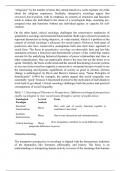Summary
Summary introduction to Sociology
- Course
- Institution
Sociology is the systematic study of society and social interaction. In order to carry out their studies, sociologists identify cultural patterns and social forces and determine how they affect individuals and groups. They also develop ways to apply their findings to the real world.
[Show more]



